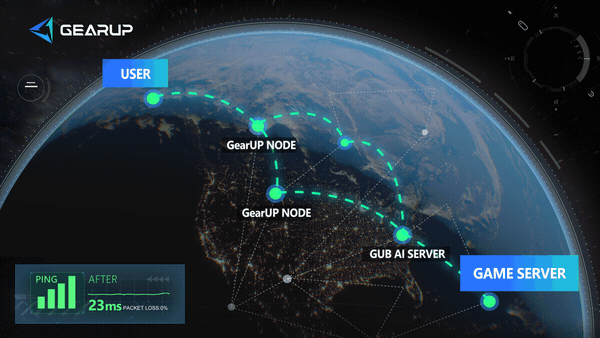Can Gaming Routers Really Lower Ping? A Comprehensive Answer
You're a passionate gamer, so you must understand how much pain lag and high ping can bring to your gaming experience. You might have been drawn to gaming routers, which claim to reduce latency and eliminate stuttering. But the real question is: Do they actually work?
To find the answer, we need to understand how gaming routers function and what problems they can truly solve. Let’s dive deeper into this topic in this article.
How Do Gaming Routers Actually Reduce Latency?
Solving "First Mile" Queueing Delays
Home network routers often experience data packet queuing due to multiple connected devices (e.g., video streaming, cloud backups), leading to delayed game command responses. High-performance gaming routers address this with Quality of Service (QoS) traffic prioritization, ensuring game packets are transmitted first, significantly reducing queue wait times. For example, even when other devices are downloading large files, gaming traffic can still maintain low latency.
Optimizing Wireless Network Stability
In densely populated environments, the 2.4GHz band is prone to interference, triggering packet retransmissions—resulting in micro-stutters even when ping values appear normal. Gaming routers excel in:
- Smart Band Switching: Prioritizing less congested 5GHz/6GHz bands
- Dynamic Channel Selection: Automatically avoiding crowded channels (similar to navigation choosing the fastest route)
- Anti-Interference Algorithms: Reducing signal conflicts caused by neighboring Wi-Fi or Bluetooth devices
Enhancing NAT & Session Management
Gaming consoles and voice chat rely on stable port mapping. Traditional routers may suffer from connection resets due to improper UPnP (Universal Plug and Play) configurations, causing sudden in-game "hiccups." Gaming routers solve this with:
- Precise Port Control: Ensuring game-required ports remain open
- Device Priority Binding: Assigning fixed IPs and guaranteed bandwidth to gaming devices
- Session Persistence Technology: Preventing connection drops due to NAT timeouts
In short, a traditional gaming router acts like a network administrator within your home. It assigns different network access priorities to various devices and applications, manages different data pathways, and ensures that your local devices and software don't compete with each other—thereby optimizing performance.
The Use Limitations of Traditional Gaming Routers
As mentioned earlier, traditional gaming routers are highly efficient at managing home network traffic, but they aren't a cure-all. To explain this, we first need to understand how network traffic travels—and we'll break it down in the simplest way possible:
- Your Device → Router (Home Network)
- Your gaming PC/console sends data (like "shoot now!" commands) to your router—the device that manages your home Wi-Fi or wired connection.
- The router’s job: Prioritize gaming traffic over other devices (like phones or TVs) to reduce lag at home.
- Router → Internet (Public Network)
- The router passes your data to your Internet Service Provider (ISP)—the company you pay for internet access (e.g., Comcast, Verizon).
- Internet → Game Server
- The data finally reaches the game’s server (the machine hosting the match).
- The server processes your action (e.g., registering a hit) and sends a reply back the same way.
The key to gaming latency often lies in the Internet part—neither routers nor players can intervene in the public network. In other words, ISPs determine which nodes transmit data, and simply adjusting gaming router settings won't change this. That's why some players still experience lag despite using professional gaming routers costing hundreds of dollars and enabling all gaming/e-sports modes.
You need a professional router specifically designed to solve gaming latency - HYPEREV.
What HYPEREV Does Differently?
HYPEREV is a router product specifically designed to solve gaming lag. Strictly speaking, it is a secondary router (currently without PPPoE functionality). Its advantage lies in its powerful adaptive intelligent routing technology, which covers over 7,500 nodes worldwide. Based on your network environment and the distribution of game servers you're playing on, it can adapt the optimal route and automatically switch in real-time, maximizing connection efficiency and stability to reduce in-game ping.


Compared to traditional routers, HYPEREV offers additional advantages:
- Plug-and-play: Whether you're using any ordinary router or a gaming router, HYPEREV can connect and optimize.
- Geo-fencing: Delineate connected server regions to help lock in matchmaking ranges and ping values.
- One-click boost: Requires no network configuration, completing optimization in just 20 seconds.
Simply put, traditional gaming routers address local network issues, while HYPEREV tackles both local and public network connection problems—which is precisely the key factor affecting gaming latency.
Regular Router vs. Generic Gaming Router vs. HYPEREV
Let's take a direct look at the comparison between the three different types of routers:
| Feature | Regular Router | Gaming Router | HYPEREV |
|---|---|---|---|
| Network Optimization | Not available | Local network optimization (Gaming Mode) | Optimizes network from player device to game server |
| Latency Reduction | Not available | Slight reduction | Significant reduction |
| PPPoE Function | Yes | Yes | No |
| WiFi | 2.4G/5G | 2.4G/5G | 2.4G/5G |
| NAT Optimization | Minimal effect | Some improvement | Significant improvement |
| Device Management | Advanced | Complete | Basic |
| Ease of Use | Requires configuration | Needs complex configuration | Plug-and-play |
| Size | Standard router size | ~2x standard router | ~Half standard router size |
| Price | $80-$150 | $300 or higher | $60-$70 |
Final
Regarding whether gaming routers can reduce ping, the answer is definitely yes—but the key lies in where your high ping originates. If your local network has numerous connected devices consuming significant bandwidth, then traditional gaming routers can help. However, most latency stems from public networks, and this is where HYPEREV excels. So, if you want to quickly reduce latency, why not try this tool specifically designed to lower gaming ping?
About The Author
The End